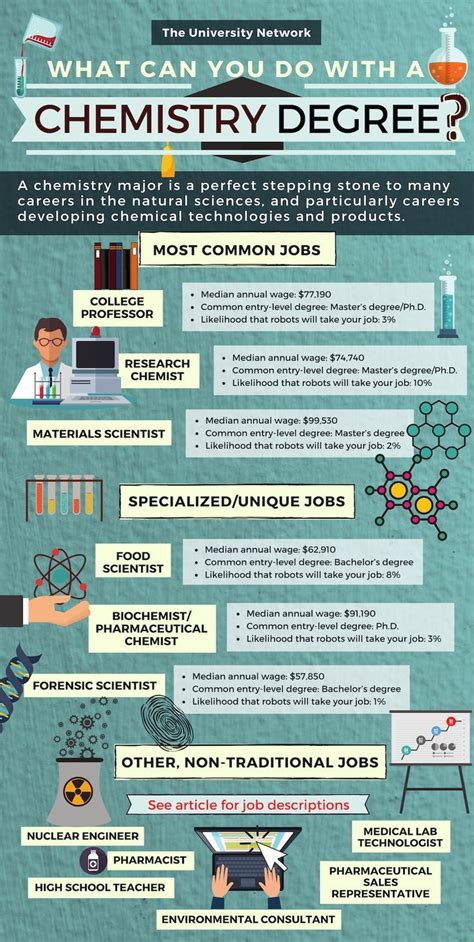A minor in chemistry offers a unique opportunity to explore the fascinating world of chemistry, complementing your major field of study and opening doors to a wide range of career paths. This article explores the benefits of pursuing a minor in chemistry, the curriculum involved, and the various career options available.

1. Enhanced Science Knowledge and Problem-Solving Skills
A minor in chemistry provides a solid foundation in core chemistry concepts, including chemical bonding, thermodynamics, kinetics, and spectroscopy. It deepens your understanding of the behavior of matter and the interactions between atoms and molecules. This enhanced scientific knowledge improves your analytical and problem-solving skills, which are invaluable in various disciplines.
2. Career Prospects in Chemical Industries
The chemical industry is a major employer of chemists and professionals with a strong understanding of chemistry. A minor in chemistry prepares you for entry-level roles in pharmaceutical, cosmetic, food, and chemical manufacturing companies. As you gain experience, you can advance to positions in research and development, quality control, and management.
3. Interdisciplinary Collaborations and Applications
Chemistry is an interdisciplinary field that intersects with numerous disciplines, including medicine, biology, environmental science, and materials science. A minor in chemistry enhances your ability to collaborate with professionals from diverse fields and contribute to cutting-edge research and innovation. You can explore novel applications of chemistry in healthcare, drug development, environmental remediation, and advanced materiales.
4. Laboratory Experience and Technical Expertise
An integral part of the minor in chemistry is hands-on laboratory experience. You will conduct experiments, analyze data, and develop critical thinking skills. This practical training equips you with technical expertise, making you proficient in various laboratory techniques and instrumentation.
5. Curriculum for a Minor in Chemistry
The typical curriculum for a minor in chemistry includes courses such as:
- General Chemistry I and II
- Organic Chemistry I and II
- Analytical Chemistry
- Physical Chemistry
- Biochemistry
- Chemistry electives
The specific course requirements may vary depending on the institution and your major field of study.
6. Career Options for Minors in Chemistry
The career options available to minors in chemistry are vast and diverse, including:
- Chemical Engineer
- Analytical Chemist
- Biochemist
- Environmental Chemist
- Forensic Chemist
- Materials Scientist
- Pharmacist
- Research Scientist
- Science Educator
7. Applications Generator (Applying Chemistry to Your Major)
To ideate potential applications of chemistry in your major field of study, consider these questions:
- In your field, what are the current challenges or unmet needs that chemistry could address?
- How could chemical principles or techniques enhance existing processes or solve problems?
- Are there unexplored or emerging areas of chemistry that could provide innovative solutions in your field?
8. Tables for Refernce
Table 1: Employment Projections for Chemists
| Occupation | Projected Percent Change 2021-2031 |
|——————————————————–|———————————|
| Chemists | 6% |
| Biochemistry and Biophysicists | 7% |
| Environmental Scientists and Specialists | 8% |
| Materials Scientists | 9% |
(Source: U.S. Bureau of Labor Statistics)
Table 2: Median Annual Salaries for Chemists
| Occupation | Median Annual Salary 2021 |
|——————————————————–|—————————–|
| Chemists | $86,010 |
| Biochemistry and Biophysicists | $94,270 |
| Environmental Scientists and Specialists | $93,130 |
| Materials Scientists | $100,090 |
(Source: U.S. Bureau of Labor Statistics)
Table 3: Top Industries for Chemists
| Industry | Percent Employed 2021 |
|——————————————————–|————————-|
| Pharmaceutical and Medicine Manufacturing | 24% |
| Chemical Manufacturing | 16% |
| Scientific Research and Development Services | 12% |
| Educational Services | 11% |
(Source: U.S. Bureau of Labor Statistics)
Table 4: Benefits of Pursuing a Minor in Chemistry
| Benefit | Impact |
|——————————————————–|——–|
| Enhanced scientific knowledge and problem-solving skills | Increased analytical and critical thinking abilities |
| Career prospects in chemical industries | Access to entry-level roles in various chemical sectors |
| Interdisciplinary collaborations and applications | Ability to contribute to interdisciplinary research and innovation |
| Laboratory experience and technical expertise | Proficiency in laboratory techniques and instrumentation |
9. Tips and Tricks for Success
- Start early: Begin planning for your minor as soon as possible to ensure you can fulfill all requirements.
- Talk to your advisor: Consult with your academic advisor to discuss your interests, career goals, and the best approach for pursuing a minor in chemistry.
- Manage your time wisely: Balancing a minor with your major coursework can be challenging. Develop a structured study schedule and prioritize your tasks effectively.
- Seek research opportunities: Consider participating in undergraduate research projects or internships to gain practical experience and explore specific areas of chemistry.
- Join professional organizations: Become a member of organizations such as the American Chemical Society (ACS) to stay abreast of industry trends, attend conferences, and connect with professionals.
10. Common Mistakes to Avoid
- Underestimating the workload: Do not underestimate the time and effort required to complete a minor in chemistry. It involves a significant amount of coursework and laboratory work.
- Neglecting your major: Your minor should complement your major field of study, not compete with it. Prioritize your major coursework to ensure a strong foundation in your primary area of expertise.
- Isolating yourself: Chemistry is an interdisciplinary field, so don’t isolate yourself from your classmates and professors. Engage in study groups, ask for help when needed, and build relationships with faculty members.
- Missing deadlines: Adhering to deadlines is crucial in chemistry. Plan your work schedule well and avoid procrastination to stay on track.
- Ignoring safety protocols: Chemistry labs involve handling hazardous materials. Always follow safety protocols and wear appropriate protective gear to ensure your well-being.
